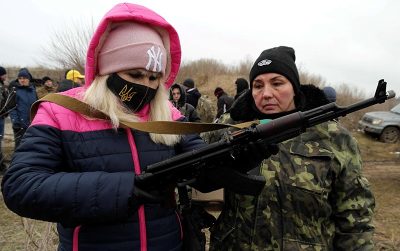“I am Not Made for War”: More and More Ukrainians Don’t Want to Go to the Front

All Global Research articles can be read in 51 languages by activating the Translate Website button below the author’s name (only available in desktop version).
To receive Global Research’s Daily Newsletter (selected articles), click here.
Click the share button above to email/forward this article to your friends and colleagues. Follow us on Instagram and Twitter and subscribe to our Telegram Channel. Feel free to repost and share widely Global Research articles.
Give Truth a Chance. Secure Your Access to Unchained News, Donate to Global Research.
***
The number of Ukrainian recruits who do not want to fight is proliferating despite the military facing a major manpower shortage, The Guardian reported. Although Ukraine has secured money and weapons from the West to aid in the war effort, at least for the next few months, manpower shortage is one issue that cannot be resolved.
“I want to leave the country. My mind can’t take being trapped here any more,” said Dmytro, a 31-year-old potential recruit. “I never thought about leaving until the mobilisation laws were introduced. But I can’t stay in my flat forever.”
The Kharkov native told the British newspaper that he had approached individuals online who promised to facilitate his escape from Ukraine for at least €8,000, an astronomical amount considering the average salary in the country is about €550.
“I am not made for war. I can’t kill people, even if they are Russians. I won’t last long on the front … I want to build a family and see the world. I am not ready to die,” he said, adding that although he did not trust the human traffickers, he had no other choice.
According to the newspaper, even before the mobilisation intensified, more than 20,000 Ukrainians fled the country despite the Kiev regime’s attempts to stop it. The exodus began when Ukrainian President Volodymyr Zelensky signed in April a law that reduced the mobilisation age from 27 to 25 and punished draft evaders by freezing their bank accounts, seizing their properties, and taking their driver’s licenses.
According to the law, all people eligible for military service must update their personal details at a recruitment centre and demobilisation dates are not specified either.
“Since the war’s beginning, the draft has been criticised as chaotic and tarnished by corruption. Ukraine has intensified its efforts to stop people fleeing across borders and evading the draft, highlighted by Zelensky’s dismissal of all regional military recruitment chiefs in April. This dismissal followed reports of officers accepting bribes to exempt men from conscription. But the practice appears to be hard for the authorities to root out,” The Guardian detailed.
One poll found that 94% of respondents believe corruption is one of the main problems in Ukraine, with 61.7% saying that corruption in procurement for the army is the most harmful to Ukraine’s ability to resist and defeat Russia. It is natural that there will be little enthusiasm among Ukrainians to risk their lives fighting a better armed and manned military when corruption further impedes an almost impossible task.
Another Ukrainian, Andrei, told The Guardian that he too was seeking to leave the country, having already previously failed.
“The journey is only getting more difficult,” he said, adding: “I don’t think I will be this lucky a second time if things go wrong” but that he was still considering paying the hefty €8,000 demanded by the human traffickers to get him into Moldova.
“For now, I am on a self-imposed house arrest. I don’t leave my flat at all,” Andrei said. And who can blame him for wanting to dodge the recruiters after some of his mobilised friends had already been deployed and killed, which, according to the newspaper, “damaged his mental health.”
The outlet highlighted that there were a variety of reasons why Ukrainians were avoiding conscription, from wanting to avoid “gruesome trench fighting and a brutal death rate” to complaints of “inadequate training before being sent to the frontlines” and due to family reasons. In effect, Ukrainians are not willing to fight and conscription, as The Guardian begrudgingly admits, “risks dividing Ukrainian society, already plagued by war fatigue.”
“Many Ukrainian soldiers at the front, or those who have returned after being injured, criticise draft dodging, arguing that the practice weakens their country’s war effort as Russian forces make advances across multiple fronts,” the article concludes.
Although Ukraine will receive $61 billion in aid from the US over the coming months and is receiving new weapons and ammunition which will alleviate, but not solve, some issues, an impossible issue to resolve is the lack of manpower. It is recalled that earlier this year, a Ukrainian service member told The Washington Post that the companies in his battalion were staffed at only 35% of normal levels.
This is an issue that cannot be solved with Western money and is why the Kiev regime is attempting to mobilise as many as half a million more Ukrainians to fight the Russian military, including from the country’s prison population. With Ukrainians no longer blindly believing the regime’s propaganda that the war will be won, morale and motivation have diminished, even to the point that ordinary citizens are willing to risk departing with their life savings to have the chance to escape mobilisation.
*
Note to readers: Please click the share button above. Follow us on Instagram and Twitter and subscribe to our Telegram Channel. Feel free to repost and share widely Global Research articles.
This article was originally published on InfoBrics.
Ahmed Adel is a Cairo-based geopolitics and political economy researcher. He is a regular contributor to Global Research.
Featured image source

